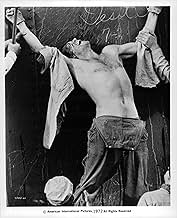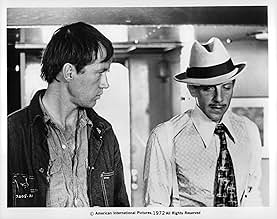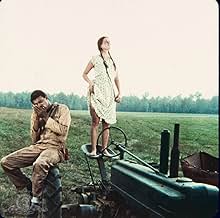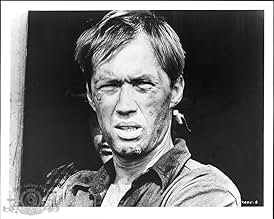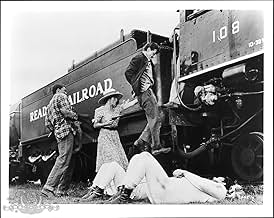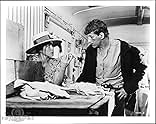ÉVALUATION IMDb
6,0/10
12 k
MA NOTE
Durant la Grande Dépression, un dirigeant syndical et une jeune femme deviennent criminels pour se venger de la gestion d'un chemin de fer.Durant la Grande Dépression, un dirigeant syndical et une jeune femme deviennent criminels pour se venger de la gestion d'un chemin de fer.Durant la Grande Dépression, un dirigeant syndical et une jeune femme deviennent criminels pour se venger de la gestion d'un chemin de fer.
- Director
- Writers
- Stars
- Prix
- 1 nomination au total
David Osterhout
- McIver #2
- (as David R. Osterhout)
Grahame Pratt
- Emeric Pressburger
- (credit only)
'Chicken' Holleman
- M. Powell
- (credit only)
Harry Northup
- Harvey Hall
- (as Harry Northrup)
Jerry Cortez
- Sheriff
- (uncredited)
Louie Elias
- Boxcar Tough
- (uncredited)
Michael Fitzgerald
- Apple Peeler
- (uncredited)
Gerald Raines
- Train Engineer
- (uncredited)
Gayne Rescher
- Brothel Client
- (uncredited)
Avis en vedette
Roger Corman's indirect influence on the 70s movie renaissance is often overlooked. Many of that decade's key players served their apprenticeships on Corman's quickies. Directors like Coppola, Bogdanovich, Bartel and Demme, and actors like Nicholson, Hopper, Fonda, Dern, Stanton, and even De Niro.
Add Martin Scorsese to that list. 'Boxcar Bertha', his movie directly before the breakthrough 'Mean Streets', may not display his talent in full, but it is a surprisingly well shot and acted, and is an above average b-grade movie with a lot of entertainment value.
Like similar Corman productions from this period ('Bloody Mama', 'Dillinger', 'Big Bad Mama') it is a Depression era look at flamboyant criminals. An exploitation movie for sure, but exploitation with style and class. Barbara Hershey (who would reunite with Scorsese in seriously underrated 'The Last Temptation Of Christ') plays the title role, but the real star of the movie is her then real life partner David Carradine ('Kung Fu', 'Death Race 2000'), who gives a strong, charismatic performance. The supporting cast includes blaxploitation legend Bernie Casey ('Cleopatra Jones',etc.), Carradine's veteran character actor father John, and Scorsese/Ferrara regular Victor Argo ('Taxi Driver', 'King Of New York').
'Boxcar Bertha' is by no means one of Scorsese's greatest achievements, but it is nothing to be embarrassed about either. Check it out sometime. It's much better than you would think.
Add Martin Scorsese to that list. 'Boxcar Bertha', his movie directly before the breakthrough 'Mean Streets', may not display his talent in full, but it is a surprisingly well shot and acted, and is an above average b-grade movie with a lot of entertainment value.
Like similar Corman productions from this period ('Bloody Mama', 'Dillinger', 'Big Bad Mama') it is a Depression era look at flamboyant criminals. An exploitation movie for sure, but exploitation with style and class. Barbara Hershey (who would reunite with Scorsese in seriously underrated 'The Last Temptation Of Christ') plays the title role, but the real star of the movie is her then real life partner David Carradine ('Kung Fu', 'Death Race 2000'), who gives a strong, charismatic performance. The supporting cast includes blaxploitation legend Bernie Casey ('Cleopatra Jones',etc.), Carradine's veteran character actor father John, and Scorsese/Ferrara regular Victor Argo ('Taxi Driver', 'King Of New York').
'Boxcar Bertha' is by no means one of Scorsese's greatest achievements, but it is nothing to be embarrassed about either. Check it out sometime. It's much better than you would think.
Scorsese refers to this 1972 Roger Corman quickie--he shot it in the deep South in twenty-one days--as his "exploitation picture." Funny, that--if it came out today, it'd be the height of the Arty Independent Film. Barbara Hershey and David Carradine are this movie's knockoff of Bonnie and Clyde; the script ain't much, but Scorsese storyboarded every shot and hoo doggie! This guy was the greatest shotmaker ever, even when he was on Skid Row. Rent it for Hershey's lyrical style and the chance to discern the fetus of a genius.
Boxcar Bertha is an early Scorcese, made just on the eve of his highly personal breakthrough film Mean Streets. In other words, these were the days before he could call the shots and was merely a jobbing director. It's a cheap exploitation flick, and like most B-pictures it's a cash-in knock-off of a recent hit movie in this case Bonnie and Clyde. It crams in all the essential ingredients for the genre hold-ups, union men, pinkertons, chain gangs and, of course, boxcars along with a dash of nudity and gory violence to help it sell.
The story follows the same arc as its peers likable proles take to a life of crime to escape the depression, have a number of run-ins and adventures, until they eventually meet their downfall. The screenplay is fairly lazy and predictable, although the writers have tried to inject some depth and conflict to the characters. Bill, for example, struggles to reconcile his socialist values with his individualist criminal antics. Rake is ashamed of his cushy city roots and wants desperately to prove himself. Bertha herself is portrayed as a kind of happy-go-lucky individual with no real agenda apart from living the life she enjoys and being with the man she loves. Sadly these ideas are never fully explored, and tend to get lost behind the simplistic b-action setting.
Boxcar Bertha also happens to be surprisingly loaded with religious references, painting Bill as a Jesus-like figure. Most obvious of these is the highly symbolic ending, but there are a number of more subtle hints. A scene somewhere in the middle opens with David Carradine standing before a biblical fresco, and later in the city Barbara Hershey stops to look at a film poster for The Man who Could Work Miracles. The religious angle is something which actually runs through all of Scorcese's work, rarely stated out loud but always under the surface.
Scorcese's technical style is fairly functional and not too flamboyant, but there are some hints towards the methods he would later make his own. He relies very heavily upon the editing process for impact a dynamic cut emphasises every moment of action. There aren't too many of the lengthy tracking shots that he is known for, and what camera moves there are are shaky and poorly planned, even if he really is trying to make something of them. This is all understandable though planning elaborate camera moves is very time consuming, and apparently the shoot for this picture was a mere twenty-four days. Besides, snappy editing is a good way to get something out of next to nothing in a fast-paced action flick.
It's an interesting touch to see father and son actors John and David Carradine playing each others nemeses. Both are fine actors, although unfortunately the former was largely relegated to minor supporting parts in A pictures, while the latter was usually lumbered with lead roles in B pictures. Only occasionally did either of them get to shine, and Carradine Senior is particularly good here even if it is another small role. But the real standout here is Barbara Hershey in the title role. She gives Bertha a kind of playful innocence, but allows the character to mature and show more depth of emotion towards the end of the picture.
When all's said and done, Boxcar Bertha is a cut above the average cheapie, but only a small cut. Scorcese has done a fair job with the material, and there is an occasional surprising moment of quality. It's good fun too in many places, particularly the cheeky dialogue given to Bernie Casey (Von), as well as the Laurel and Hardy-like pinkerton agents. But it also has a dull plot, annoying musical score, cheep-and-cheerful production values and is just too short to really take off.
The story follows the same arc as its peers likable proles take to a life of crime to escape the depression, have a number of run-ins and adventures, until they eventually meet their downfall. The screenplay is fairly lazy and predictable, although the writers have tried to inject some depth and conflict to the characters. Bill, for example, struggles to reconcile his socialist values with his individualist criminal antics. Rake is ashamed of his cushy city roots and wants desperately to prove himself. Bertha herself is portrayed as a kind of happy-go-lucky individual with no real agenda apart from living the life she enjoys and being with the man she loves. Sadly these ideas are never fully explored, and tend to get lost behind the simplistic b-action setting.
Boxcar Bertha also happens to be surprisingly loaded with religious references, painting Bill as a Jesus-like figure. Most obvious of these is the highly symbolic ending, but there are a number of more subtle hints. A scene somewhere in the middle opens with David Carradine standing before a biblical fresco, and later in the city Barbara Hershey stops to look at a film poster for The Man who Could Work Miracles. The religious angle is something which actually runs through all of Scorcese's work, rarely stated out loud but always under the surface.
Scorcese's technical style is fairly functional and not too flamboyant, but there are some hints towards the methods he would later make his own. He relies very heavily upon the editing process for impact a dynamic cut emphasises every moment of action. There aren't too many of the lengthy tracking shots that he is known for, and what camera moves there are are shaky and poorly planned, even if he really is trying to make something of them. This is all understandable though planning elaborate camera moves is very time consuming, and apparently the shoot for this picture was a mere twenty-four days. Besides, snappy editing is a good way to get something out of next to nothing in a fast-paced action flick.
It's an interesting touch to see father and son actors John and David Carradine playing each others nemeses. Both are fine actors, although unfortunately the former was largely relegated to minor supporting parts in A pictures, while the latter was usually lumbered with lead roles in B pictures. Only occasionally did either of them get to shine, and Carradine Senior is particularly good here even if it is another small role. But the real standout here is Barbara Hershey in the title role. She gives Bertha a kind of playful innocence, but allows the character to mature and show more depth of emotion towards the end of the picture.
When all's said and done, Boxcar Bertha is a cut above the average cheapie, but only a small cut. Scorcese has done a fair job with the material, and there is an occasional surprising moment of quality. It's good fun too in many places, particularly the cheeky dialogue given to Bernie Casey (Von), as well as the Laurel and Hardy-like pinkerton agents. But it also has a dull plot, annoying musical score, cheep-and-cheerful production values and is just too short to really take off.
Director Martin Scorsese stages some beautifully choreographed violence in "Boxcar Bertha", his first studio film, but he had yet to break through to his actors, and much of the picture is stilted or awkward. Barbara Hershey plays Bertha Thompson, a teenage orphan in Depression-scarred Arkansas who falls in league (and in love) with a union organizer; they're joined by a black harmonica player and a Yankee card-shark to take revenge on the railroad company by robbing the trains. Adapted from Ben L. Reitman's book "Sister of the Road", Scorsese as a filmmaker is a bit misplaced within this milieu--the 1930s doesn't seem to be his thing--and while the film has atmosphere, it lacks visual assurance and nuance. Similarly, Hershey doesn't seem to connect with the Depression, either; with her dreamy eyes, flowing chestnut hair and penchant for throwing her lines away blithely, she's more like a Boxcar Hippie. Still, Scorsese uses her well at certain moments, particularly early on when she's shooting craps around a campfire, correcting a friend about her surname, or staring out a rain-soaked window. She also looks great chasing after locomotives, and the train sequences are all well-filmed. The finale, a slaughter out in the middle of nowhere, packs a visual wallop. It seems certain the youthful director saved his creative juices for this sequence, and his cinematic prowess suddenly flairs up. Visceral and expressive, this showdown turns the story around from mere exploits of low-class gangsters into something far more profound: a sorrowful human tragedy soaked in consequence and fate. **1/2 from ****
Early, solid film from Scorcese with Hershey as the heroine, who along with Carradine leads a pack of hoods who begin as communists and progress to bigger and bigger crimes -- something of a variation on Corman's "Machine Gun Kelly." Carradine and Hershey give good, but not outstanding, performances. The direction is somewhat showy and involves a lot of movement, typical of Scorcese's more evolved style as well. Roughly follows the mold set by previous AIP gangster mama flicks, with the step up on the violence meter each succeeding film seemed to demand.
Interesting also that this is the only Corman/AIP collaboration I can remember seeing from this period of time (72) when Corman's independent operations were becoming more successful all the time (w/ the nurse movies and stewardess epics cleaning up at the box office). I can only think that they saw it as a continuation of such a successful collaboration that it was impossible to resist getting together again one more time (though Corman claims to have been so absolutely disgusted by their treatment of his epic "Gasssssss" that he would no longer work with them after 1970). Anyone with information on how this collaboration took place will make me very grateful by forwarding this information to me.
Interesting also that this is the only Corman/AIP collaboration I can remember seeing from this period of time (72) when Corman's independent operations were becoming more successful all the time (w/ the nurse movies and stewardess epics cleaning up at the box office). I can only think that they saw it as a continuation of such a successful collaboration that it was impossible to resist getting together again one more time (though Corman claims to have been so absolutely disgusted by their treatment of his epic "Gasssssss" that he would no longer work with them after 1970). Anyone with information on how this collaboration took place will make me very grateful by forwarding this information to me.
What Scorsese Film Ranks Highest on IMDb?
What Scorsese Film Ranks Highest on IMDb?
Cinema legend Martin Scorsese has directed some of the most acclaimed films of all time. See how IMDb users rank all of his feature films as director.
Le saviez-vous
- AnecdotesAfter he finished this film, Martin Scorsese screened it for John Cassavetes. Cassavetes, after seeing it, hugged Scorsese and said, "Marty, you've just spent a whole year of your life making a piece of shit. It's a good picture, but you're better than the people who make this kind of movie. Don't get hooked into the exploitation market, just try and do something different." Scorsese's next film was Les rues chaudes (1973).
- GaffesThe currency shown in the film is all modern, post 1960s, with modern banking money bands.
- Citations
Boxcar Bertha: Pay no attention to that man behind the curtain.
- Générique farfeluOpening Statement: The following events are adapted from the true experiences of Boxcar Bertha Thompson, as related in the book "Sister of the Road"
- Autres versionsThe restored 2020 version added a 12 seconds shot introducing the party around the 58th minute.
- ConnexionsFeatured in The Directors: The Films of Roger Corman (1999)
Meilleurs choix
Connectez-vous pour évaluer et surveiller les recommandations personnalisées
- How long is Boxcar Bertha?Propulsé par Alexa
Détails
Box-office
- Budget
- 600 000 $ US (estimation)
- Brut – à l'échelle mondiale
- 6 443 $ US
- Durée1 heure 28 minutes
- Couleur
- Rapport de forme
- 1.85 : 1
Contribuer à cette page
Suggérer une modification ou ajouter du contenu manquant



